New Tekya Ad Fraud Found on Google Play

By Ford Qin (Mobile Threats Analyst)
In late March, researchers from CheckPoint found the Tekya malware family, which was being used to carry out ad fraud, on Google Play. These apps have since been removed from the store, but we recently found a variant of this family that had made its way onto Google Play via five malicious apps, although these have also been removed. (We detect these as AndroidOS_Tekya.HRX.)

 Figures 1 and 2. Apps with Tekya malware (Click to enlarge)
Figures 1 and 2. Apps with Tekya malware (Click to enlarge)
Connections between two versions
This variant of Tekya shares many similarities with the previously found version. For example, the encryption remains essentially identical. The same algorithms and keys are used in both versions.
 Figure 3. Encryption code from previous Tekya version
Figure 3. Encryption code from previous Tekya version
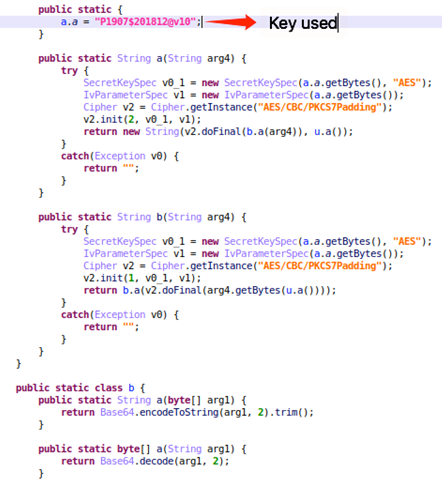 Figure 4. Encryption code from this Tekya version
Figure 4. Encryption code from this Tekya version
How this Tekya variant works
The malware registered a receiver that responds to the actions “com.tenjin.RECEIVE” or “android.intent.action.BOOT_COMPLETED”. The latter action gives the malware the ability to wake after the device boots:
 Figure 5. Registered receiver
Figure 5. Registered receiver
The functionality of the receiver is implemented in libtenjin.so. Once called, it would then call a method which hides itself in a common package — specifically, com/google/android/gms/internal/ads/.
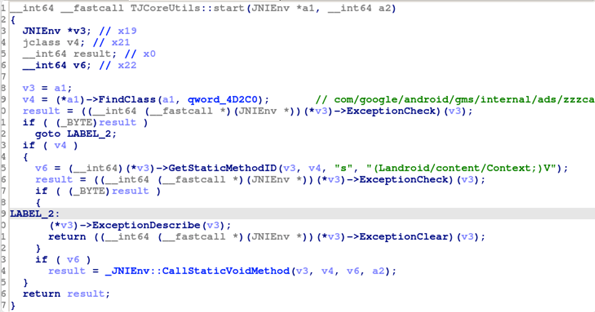 Figure 6. Malicious method call
Figure 6. Malicious method call
The method called is responsible for downloading a .dex file and loading it. In the case we were analyzing, the said file would be downloaded twelve hours after the malware was installed. The downloaded file is encrypted; it is decrypted and loaded by libtenjin.so.
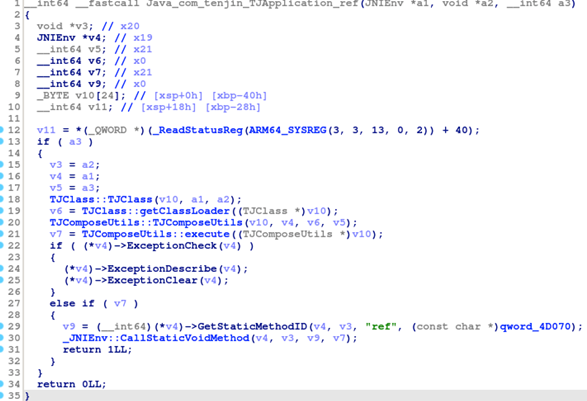 Figure 7. Decryption and loading of decrypted file
Figure 7. Decryption and loading of decrypted file
Once the downloaded .dex file been loaded, it would attempt to register itself with a configuration server. The information that is part of the registration includes device ID, user accounts, location, MAC address, and others (as seen below):
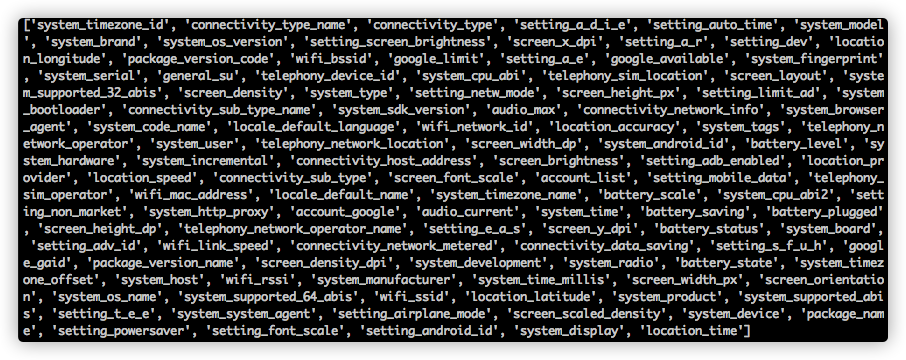 Figure 8. Properties uploaded to the configuration server
Figure 8. Properties uploaded to the configuration server
If the server did not reject the registration, an encrypted configuration file would be downloaded. This contains information about the ads to be loaded and control flags. (The blurred text contains information about about the ad accounts potentially used by the attacker, which we have opted to remove.)
 Figure 9. Contents of downloaded configuration file
Figure 9. Contents of downloaded configuration file
The malware would do various checks, including time, control flags, and so on based on the downloaded configuration. If those checks passed, Tekya would hide itself.
 Figure 10. Code to hide icon
Figure 10. Code to hide icon
According to its code, Tekya would target up to 11 advertising networks, including: Admob, Facebook, and Unity. Advertisements from these networks would be displayed, and user touch events imitated through InputManager.
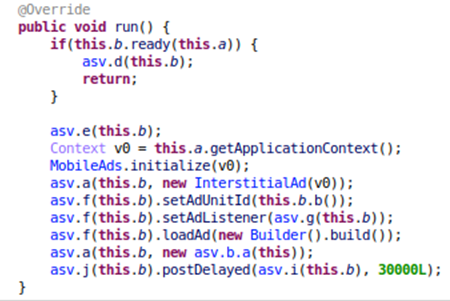 Figure 11. Code to load Admob
Figure 11. Code to load Admob
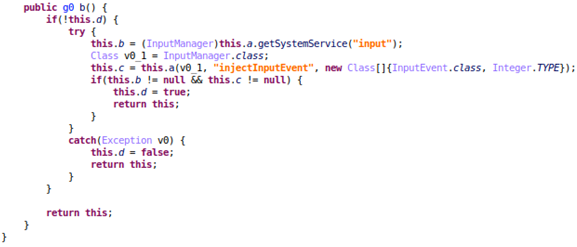 Figure 12. Code to inject input event
Figure 12. Code to inject input event
Tekya would try to trick victims into believing those advertisements were opened by other applications by changing its icon and label to that of another app on the device.
 Figure 13. Code for Tekya to choose which icon and label to imitate
Figure 13. Code for Tekya to choose which icon and label to imitate
We originally found several of these apps on Google Play, but Google removed these from the App Store while our research was underway. We are still watching for any similar threats that may emerge in the wild.
Trend Micro solutions
Users can install security solutions, such as Trend Micro Mobile Security for iOS and Trend Micro
Mobile Security for iOS and Trend Micro Mobile Security for Android
Mobile Security for Android (also available on Google Play), that can block malicious apps. End users can also benefit from their multilayered security capabilities that secure the device owner’s data and privacy, and features that protect them from ransomware, fraudulent websites, spyware, and identity theft.
(also available on Google Play), that can block malicious apps. End users can also benefit from their multilayered security capabilities that secure the device owner’s data and privacy, and features that protect them from ransomware, fraudulent websites, spyware, and identity theft.
For organizations, the Trend Micro Mobile Security for Enterprise suite provides device, compliance and application management, data protection, and configuration provisioning. The suite also protects devices from attacks that exploit vulnerabilities, prevents unauthorized access to apps, and detects and blocks malware. Trend Micro’s Mobile App Reputation Service (MARS) covers Android and iOS threats using leading sandbox and machine learning technologies to protect users against malware, zero-day and known exploits, privacy leaks, and application vulnerability.
Mobile Security for Enterprise suite provides device, compliance and application management, data protection, and configuration provisioning. The suite also protects devices from attacks that exploit vulnerabilities, prevents unauthorized access to apps, and detects and blocks malware. Trend Micro’s Mobile App Reputation Service (MARS) covers Android and iOS threats using leading sandbox and machine learning technologies to protect users against malware, zero-day and known exploits, privacy leaks, and application vulnerability.
Indicators of Compromise (IoCs)
All of the malicious files below are detected as AndroidOS_Tekya.HRX.
| Package name | SHA256 hash |
| awakens.download.mp3pro | 35f9077b4774456526b088496413bd5559c293b7ae49da89c5b7b51132667879 |
| com.waygame.hoppingcat | 359f581980faa4e27acf19a9bfae0214d6e92690bcbce0d19e9b0053200f6cd2 |
| com.halfbrain.trafficjam | 114b8f6a345ee403487e79d4110fcd28e5a9b67ebe5821cd2f7a296d06ae1de2 |
| com.halfbrain.petjumping | c4e00591e0eb947fded1ea925c3aa4e5e2f47a8adbfc096f174a84a2205bbf5a |
| com.runninggame.squarefish | 0d58e04908a506adf06ec49e55227892d1abbe4ad245a822ff0dab15c774f2f4 |
The post New Tekya Ad Fraud Found on Google Play appeared first on .

![[EVEREST] - Ransomware Victim: Collins Aerospace Admits Responsibility for Flight Chaos at Heathrow, Brussels and Other M[.][.][.] 19 image](https://www.redpacketsecurity.com/wp-content/uploads/2024/09/image-300x300.png)

